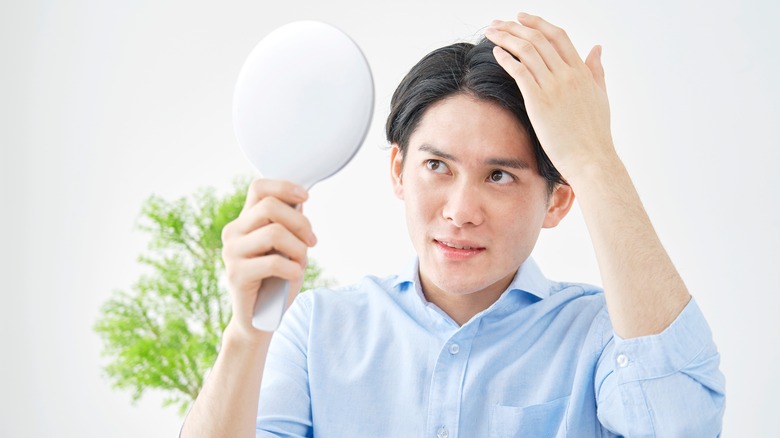Study Finds What One Sugary Drink A Day Can Do To Men's Hair
Male pattern hair loss (MPHL) doesn't come on all at once. Rather, the American Academy of Dermatology Association (AAD) states that the condition often starts with the emergence of a bald patch on the top of the head or as a progressively receding hairline. Over time, the result is the gradual thinning and loss of hair. In a new study published in Nutrients, researchers note that MPHL can affect one's mental health and overall quality of life.
While many different factors can influence the development of the condition, the researchers specifically looked at the relationship between the consumption of sugary beverages and the onset of MPHL in more than 1,000 male participants in China during the first four months of 2022. Participant age ranged from 18 to 45. Using anonymous digital survey data, participants disclosed their height, weight, socio-demographic information, hair status, diet, lifestyle factors, and psychological state. The researchers also analyzed the frequency with which participants consumed sugary drinks, such as fruit juices, energy drinks, soda, sweetened teas or coffee, and more.
Greater consumption of sugary beverages may influence hair loss amongst young men
The frequency of participant beverage consumption was separated into categories ranging from zero drinks per week to over three times a day, as per the study. 44.6% of participants reported drinking sugary beverages more than once a day. For those with MPHL, sugary drink consumption was found to be higher than consumption amounts reported amongst participants who did not have the condition. Overall, those who drank sugary drinks over seven times weekly were more susceptible to developing MPHL. In essence, consuming just one sugary drink a day may increase the likelihood of hair loss amongst young men, reports Healthline.
As outlined in the research, increased rates of male pattern hair loss are beginning to emerge amongst younger and younger age groups. However, experts caution that these study findings merely illustrate a link between drinking sugary beverages and MPHL, but cannot be deemed the sole cause of the condition. Additional factors, such as smoking, anxiety, alcohol consumption, diet, family medical history, and more, may also contribute to the development of MPHL. Therefore, although further research is needed, the study team emphasizes that raising awareness around the potential connection between sugary beverage consumption and hair thinning may prompt younger men to practice prevention by minimizing their intake of such drinks.


